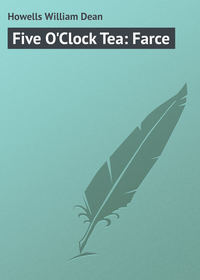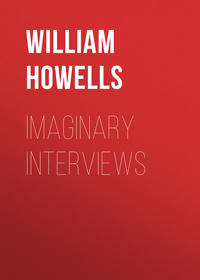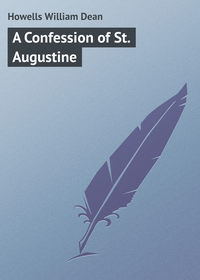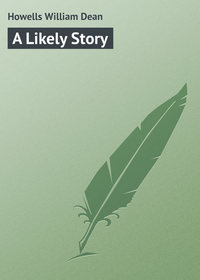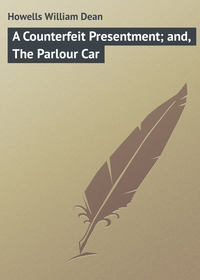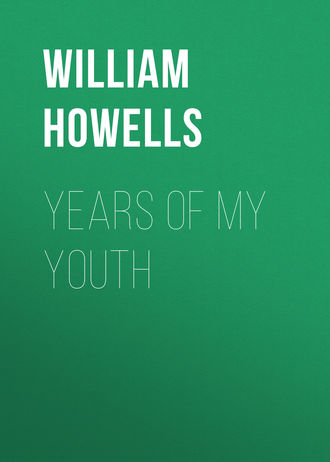 полная версия
полная версияYears of My Youth
The young editors were the only guests; and after dinner the family did not forbid itself the gaieties befitting its young people’s years. We had charades, then much affected in society, and I believe the Governor alone was not pressed into helping dramatize the riddle to be finally guessed as Canterbury Bell. I do not remember how the secret was kept to the end, or guessed from the successive parts. My fear and pride were put to a crucial test in the first dissyllable, which the girlish hostess assigned me, and nothing but the raillery glancing through the deep lashes of her brown eyes which were very beautiful, could have brought me to the self-sacrifice involved. I lived through the delight and anguish of that supreme evening, and found myself, as it were, almost immediately afterward in society. It could not have been quite immediately, for when I called at the Governor’s soon after New-Year’s and he asked me if I had made many New-Year’s calls I answered that I had not made any because I knew no one. Then he said I might have called at his house; and I did not fail, on this kind reproach, to go to Miss Chase’s next reception, where again she laughed at my supposed dignity in refusing to dance; she would not suppose my inability.
But before entering that field so flowery fair which society now seemed to open before me perhaps I had better continue my recollections of a man whose public career has its peculiar pathos. It was his constant, his intense, his very just desire to be President; no man of his long time was fitter to be President, unless his ambition was a foible that unfitted him. He accepted not the first place, but the second place, in the administration of the man whose place as President he had so ardently longed to fill, and after he had resigned his governorship of Ohio and gone to Washington as Secretary of the Treasury under Lincoln I saw him there when I went to look after the facts of the consulship which had been offered me. His fellow Ohioans must have swarmed upon him in the eagerness for public service afterward much noted in them, and I do not blame him for imagining that I had called upon him in the hope that he would urge my case upon the President. He said, rather eagerly, that he had no influence with the administration (it likewise became Lincoln’s own humorous complaint) quite before I had asked it, and was sorry that he could not help me; and when I thanked him and remarked that I believed the President’s private secretaries, Hay and Nicolay, were interested in my affair, he said, with visible relief, Oh well, then, I was in the best possible hands; as indeed it turned out. I had heard before that he had spoken to the President in my behalf, and he may very well have felt that he had done his best.
Four years later, and ten years after my first acquaintance with Chase, I went to call upon him at his hotel in New York, when I was lately returned from my consular post in Venice, and ventured to offer him my congratulations upon his accession to the chief-justiceship of the Supreme Court. He answered bluntly that it was not the sort of office he had aspired to, and intimated that it was a defeat of his real aspirations. He was not commonly a frank man, I believe, but perhaps he felt that he could be frank with the boy I must still have seemed even at twenty-eight, bringing the devotion he possibly over-imagined in me. Since then those words of his, which were the last I was to hear from him, have been of an increasing appeal with me; and if the Republicans had not had Lincoln I still think it was a pity they could not have had Chase. At the end, the Democrats would not have him.
VIII
Chase was of course our man for the 1860 nomination, and the political relations between him and our chief were close; but somehow I went more to other houses than to his, though I found myself apparently launched from it upon a social tide that bore me through all the doors of the amiable little city. I was often at the evening parties (we called them evening parties then) which his daughter gave, and one day the Governor himself, as we met in the street, invited me to luncheon with him. I duly went and passed the shining butler’s misgiving into the dining-room, where I found the family at table with no vacant place among them. The Governor had forgotten me! That was clear enough, but he was at once repentant, and I lunched with him, outwardly forgiving, but inwardly resolved that it should be the last time I would come at his informal bidding. I have since forgotten much more serious engagements myself; I have not gone to dinners where I have promised over my own signature to go; but at twenty-one men are proud, and I was prouder then than I can yet find any reason for having been.
In our capital at that day we had rather the social facts than the social forms. We were invited to parties ceremoniously enough, but we did not find it necessary to answer whether we would come or not. Our hostess remained in doubt of us till we came or did not come; at least that was the case with young men; we never inquired whether it was so with young girls or not. But sometimes when a certain youth wished to go with a certain maiden he found out as delicately as he could whether she was invited, and if she was he begged her to let him go with her, and arrived with her in one of the lumbering two-horse hacks which supplied our cab-service, and which I see still bulking in the far perspective of the State Street corner of the State House yard. If you had courage so high or purse so full you had sent the young lady a flower which she wore to the party, preferably a white camellia which the German florist, known to our young world only as Joe, grew very successfully, and allowed you to choose from the tree. Why preferably a camellia I could not say after this lapse of time; perhaps because its cold, odorless purity expressed the unimpassioned emotion which oftenest inspired the gift and its acceptance. It was very simple, very pastoral; I do not know when Columbus outgrew this custom, which of course it did long ago.
Bringing a young lady to a party necessarily meant nothing but that you enjoyed the pleasure of bringing her. Very likely she found her mother there when she came with you, unmindful, the one and the other, that there was such a thing as chaperonage in a more fastidious or censorious world. It seems to me, indeed, that parties at the Columbus houses were never wanting in the elders whom our American society of girls and boys used to be accused of ignoring. They superabounded at the legislative receptions, but even at the affairs which my sophistication early distinguished from those perfunctory hospitalities there were mature people enough, both married and unmarried, who, though they had felt no charge concerning their daughters or nieces, found it agreeable to remain till the young ladies were ready to be seen home by their self-chosen escorts. A youth who danced so reluctantly as I, was rather often thrown upon these charitable elders for his entertainment, and I cannot remember ever failing of it. People, and by people I do not mean women only, read a good deal in that idyllic Columbus, and it was my delight to talk with any one who would about the new books or the old. The old books were known mostly to that number of professional men – lawyers, doctors, divines, and scientists – which was disproportionately large in our capital; they were each cultivated in his own way, and in mine, too, or the better part of it, as I found. The young and the younger women read the current fiction and poetry at least enough to be asked whether they had read this thing or that; and there was a group of young men with whom I could share my sometimes aggressive interest in our favorite authors. I put the scale purposely low; I think that I could truthfully say that there was then no American community west of the Alleghanies which surpassed ours in the taste for such things. At the same time I must confess that it would be easy for such an exclusively literary spirit as I was to deceive himself, and to think that he always found what he may have oftener brought.
For a long time after the advent of our new journalism, the kind of writing which we practised – light, sarcastic, a little cruel, with a preference for the foibles of our political enemies as themes – seemed to be the pleasure of good society, which in that serious yet hopeful time did not object to such conscience as we put into our mocking. Some who possibly trembled at our boldness darklingly comforted themselves for our persiflage by the good cause in which it frisked. When anything very daring came out in the afternoon the young news-editor in his round of calls could hear the praise of it from charming readers in the evening, or he might be stopped in the street next day and told how good it was by the fathers, or brothers, or brothers-in-law, of those charming readers. It was more like the prompt acclaim the drama enjoys than the slow recognition of literature; but I, at least, was always trying to make my writing literature, and after fifty-odd years it may perhaps be safely owned that I had mainly a literary interest in the political aspects and events which I treated. I felt the ethical quality of the slavery question, and I had genuine convictions about it; but for practical politics I did not care; I wished only to understand enough of them to seize any chance for a shot at the other side which they might give. I had been in the midst of practical politics almost from my childhood; through my whole youth the din of meetings, of rallies, of conventions had been in my ears; but I was never at a meeting, a rally, or a convention; I have never yet heard a political speech to the end. For a future novelist, a realist, that was a pity, I think, but so it was.
In that day of lingering intolerance, intolerance which can scarcely be imagined in this day, and which scarcely stopped short of condemning the mild latitudinarianism of the Autocrat of the Breakfast Table as infidelity, every one but a few outright atheists was more or less devout. In Columbus everybody went to church; the different forms of Calvinism drew the most worshipers; our chief was decorously constant with his family at the Episcopal service; but Reed was frankly outside of all ecclesiastical allegiance, and I who, no more than he, attended any religious service, believed myself of my father’s Swedenborgian faith; at any rate. I could make it my excuse for staying away from other churches, since there were none of mine. While I am about these possibly needless confidences I will own that sermons and lectures as well as speeches have mostly been wearisome to me, and that I have heard only as many of them as I must. Of the three, I prefer sermons; they interest me, they seem really to concern me; but I have been apt to get a suggestive thought from them and hide away with it in a corner of my consciousness and lose the rest. My absences under the few sermons which I then heard must have ended chiefly in the construction or the reconstruction of some scene in my fiction, or some turn of phrase in my verse.
Naturally, under these circumstances, the maturer men whom I knew were oftener doctors of medicine than doctors of divinity; in fact, I do not think I knew one clergyman. This was not because I was oftener sick than sorry; I was often sorry enough, and very sensible of my sins, though I took no established means of repenting them; but I have always found the conversation of physicians more interesting than that of most other men, even authors. I have known myself in times past to say that they were the saints of the earth, as far as we then had saints, but that was in the later Victorian period when people allowed themselves to say anything in honor of science. Now it is already different; we have begun to have our doubts of doubt and to believe that there is much more in faith than we once did; and I, within the present year, my seventy-ninth, have begun to go to church and to follow the sermon with much greater, or more unbroken, attention than I once could, perhaps because I no longer think so much in the terms of fiction or meditate the muse as I much more used to do.
In those far days I thought prose fit mainly for every-day use in newspaper work. I was already beginning to print my verses in such of the honored Eastern periodicals as would take them: usually for nothing. I wrote for the Saturday Press of New York, which ambitious youth everywhere were then eager to write for, and I wrote for the Atlantic Monthly oftener than I printed in it. I have told all this and more in My Literary Passions and I will not dwell here upon the whirl of æsthetic emotion in which I eddied round and round at that tumultuous period. In that book I have also sufficiently told the story of my first formal venture in the little volume of verse which I united with my friend John J. Piatt in offering to the world. But I may add here that it appeared just at Christmas-time in 1859 from the press of a hopeful young publisher of Columbus who was making his experiment in the disquieting hour when no good thing was expected to come out of our Western Nazareth. We two were of the only four poets west of the Alleghanies who had yet been accepted by the Atlantic, and our publisher had the courage to make our book very pretty in print and binding. It was so pretty that I am afraid some readers liked it for its looks; one young lady said that I at least could have no trouble in choosing what Christmas presents I should make my friends. She was that very beautiful girl who easily bore the palm for beauty in Columbus, and I do not yet understand how I was able to reject her unprofessional suggestion with as much pride as if she had been plain. I gave my book to no one, in my haughty aversion from even the shadow of advertising, and most of my friends had their revenge, I suppose, in not buying it.
IX
I had begun now to know socially and intrinsically the little capital which I had known only politically and extrinsically during the two winters passed there as a legislative correspondent. I then consorted with the strangers whom their share in the government made sojourners, and who had little or no local quality to distinguish them from one another. I shared the generalized hospitalities offered them with that instinctive misgiving which I have rather more than hinted; and though I distinguished among them, and liked and valued certain of them, yet I had a painful sense of our common exteriorality and impermanence. I cannot say that I ever expected to become part of the proper life of the city, and when suddenly I found myself in that life, if not of it, I was very willing to find it charming. How charming it was compared with the life of other cities I had no means of knowing, but now after the experiences, not too exhaustive, of half a century I still feel it to have been charming, with the wilding grace proper to all the West in those days, and the refinement remembered from the varied culture (such culture as there was) of the East and South it derived from.
Not so many people in our town could have known me for my poetry as for my journalism, and I do not pretend that the sexes were equally divided in their recognition. I have intimated my fancy that with most men, men of affairs, men of the more serious callings, the face of the poet was saved by the audacity of the paragrapher. If I could be so sharp, so hard in my comment on the day’s events, I could not be so soft as I seemed in those rhymes where I studied the manner of Heine, the manner of Tennyson, and posed in this or that dramatized personality. I cannot flatter myself that I did not seem odd sometimes to many of my fellow-citizens, though I hope that with some of the hardest-headed among them I was acceptable for qualities which recommend average men to one another. Some of that sort made friends with me; some even who were of an entirely diverse political thinking tolerated my mockeries of opinions which they supposed their principles. But neither my pleasure nor my pride was in such friendships. What I wished to do always and evermore was to think and dream and talk literature, and literature only, whether in its form of prose or of verse, in fiction, or poetry, or criticism. I held it a higher happiness to stop at a street corner with a congenial young lawyer and enter upon a fond discussion of, say, De Quincey’s essays than to prove myself worthy the respect of any most eminent citizen who knew not or loved not De Quincey. But I held it far the highest happiness to call at some house where there were young girls waiting and willing to be called upon and to join them in asking and saying whether we had read this or that late novel or current serial. It is as if we did nothing then but read late novels and current serials, which it was essential for us to know one another’s minds upon down to the instant; other things might wait, but these things were pressing.
Of course there were some houses where such problems were of more immediate and persistent interest than other houses. Such a house was the ever-dear house of the S. family, which made itself a home any hour of the day up to midnight for such youth as had once been adopted its sons. It was not only a literary house, it was even more a musical house, where there was both singing and playing, with interludes of laughing and joking in all forms of seemly mirth, with the whole family, till the little boys of it stumbled up the stairs half asleep. I could not play, but I was sometimes suffered by that large-hearted hospitality to try singing; and I could talk with the best. So, it was my more than content in the lapses of the music to sit with the young aunt (she seemed so mature in her later twenties to me in my earliest) and exchange impressions of the books new and old that we had been reading. We frequenters of the house held her in that honor which is the best thing in the world for young men to feel for some gentle and cultivated woman; I suppose she was a charming person apart from her literary opinions; but we did not think of her looks; we thought of her wise and just words, her pure and clear mind.
It was the high noon of Tennyson and Thackeray and George Eliot and Dickens and Charles Reade, whose books seemed following one another so rapidly. The Newcomes was passing as a serial through Harper’s Magazine, and we were reading that with perhaps more pleasure than any of the other novels and with the self-satisfaction in our pleasure which I have before this argued was Thackeray’s most insidious effect with youth striving to spurn the world it longed to shine in. We went about trying to think who in the story was like whom in life, and our kind hostess was reading it, too, and trying to think that, too; but it was not well for her to say what she thought in the case of the handsomest, and for several reasons, really, the first among us. It appeared that she thought he was like Clive Newcome and that we others were like those friends of his whom in the tale his nature was shown subordinating. She said something like this to some one, and when her saying came to us others we revolted in a body. No, we would not have that theory of our relation to our friend; and I do not know to what infuriate excess of not calling for a week we carried our resentment. I do not know how after the week, if it was so long, we began calling again; but I surmise it was through something said or done by that dear Miss A. which made it easy for her sister to modify her wounding theory into a recognition of the proud equality which bound us friends together.
We are all dead now, all save me and the youngest daughter of the house, but as I think back we are all living again, and others are living who are also dead. Among these is a young lady visitor from a neighboring city, one of those beautiful creatures who render the Madonna faces of the painters credible, and of a prompt gaiety which shared our wonted mirth in its own spirit. Her beauty might have dedicated her to any mysterious fate; beauty is often of such tragical affinition; but not her gaiety; and yet the glad die, too, and this glad creature within a year had gone to the doom which sent no whisper back to the hearts left lifelong aching. Her father was appointed consul to a Mediterranean port, and she sailed with him in the ship which sailed with them both into eternity, unseen, unsignaled, as messageless as if it had been a mist swept from the face of the sea.
But well a year before this time and a year after our first meeting in Columbus I saw her in Boston, in a house swept as wholly from the face of the earth as that ship from the face of the sea. I suppose the Court House in Boston is an edifice as substantial as it is plain, but for me, when I look at the place where it stands my vision pierces to the row of quiet, dignified mansions which once lined that side of Somerset Street, and in one of which I somehow knew that I should find with her uncle’s family the beautiful creature already so unimaginably devoted to tragedy, to mystery, to the eternal baffle of surmise. It seemed that from often being there she knew the city so enchanted and enchanting to me then, and she went about with me from one wonder of it to another; and it remains in the glimmer of that association, which no after-custom could wholly eclipse. It was a moment of the glad young American life of other days which seems so impossible to after days and generations; and with the Common and its then uncaterpillared elms, with the Public Garden, just beginning in leaf and flower, with the stately dwellings which looked upon those pleasances in the streets long since abandoned to business, with the Public Library, the fine old Hancock House, and the Capitol as Bullfinch designed and left it, and the Athenæum as it used to be, and Faneuil Hall, swarming with memories for my young ardor, and the Old State House, unvisited by its manifold transformations, – the brave little city of the past is all contemporaneous again.
X
As I have said, all they of that Columbus house but one are gone. One of the little boys went before they were men, and then the other; the mother went long afterward; the elder daughter, who had been the widow of our repudiated Clive Newcome, went longer afterward yet; and then still later, finding myself once on a very mistaken lecturing-tour in Kansas, where our beloved Miss A. had lived many married years, I asked for her, hoping to see her, and heard that she had died the year before. But first of all the father died, leaving me the memory of kindness which I hardly know how to touch aright. He was my physician as well as my friend, and saw me through the many maladies, real and unreal, of my ailing adolescence, but he would have no fee for curing me of either my pains or my fears. I had come to him first with my father, who somehow knew him before me, and it was as if he became another father to me. Often in those nights of singing and playing, of talking and joking, he would look in for a moment between patients to befriend our jollity; and when at last it came to my leaving Columbus, and going that far journey to Venice, whither I seemed bound as on a journey to another planet, he asked me one night into his little outside office by the State Street gate, and had me tell him what provision I had made for the chances before me. I told him, and then whether he thought it not enough in that war-time when the personal risks were doubled by the national risks he said, “Well, I am not a rich man, or the son of a rich man, but if you think you need something more, I can let you have it.” I had been keeping my misgivings to myself, but now I owned them and borrowed the two hundred dollars which he seemed to have there with him, as if in expectation of my need.
For a darker tint in the picture I have been painting of my past let me record here a fact which may commend itself for the younger reader’s admonition; the old cannot profit by it, perhaps, though as long as we live we are in danger of forgetting kindness. When my family first came to Columbus we were much beholden to another family, poor like ourselves, which did everything but turn itself out of doors to let us have the little house we were to occupy after them. They shared it with us till they could place themselves elsewhere; and my father and mother remained bound to them in willing gratitude. When I came back to the capital after my five years of exile in our village I, too, remembered our common debt, but when the world began to smile upon me I forgot the friends who had not forgotten me till one day my father wished me to go with him to see them. The mother of the family received me with a sort of ironical surprise, and then her hurt getting the better, or the worse, of her irony, she said some things about my losing sight of humble friends in the perspectives opening so alluringly before me. I could not recall, if I would, just the things she said, but they scorched, and the place burns yet; and if I could go back and repair the neglect which she brought home to me how willingly, after nearly sixty years, would I do it! But at the time I hardened my heart and as I came away I tried to have my father say something in extenuation of the fault which I angrily tried to make a merit of; but with all his tenderness for me he would not or could not.


